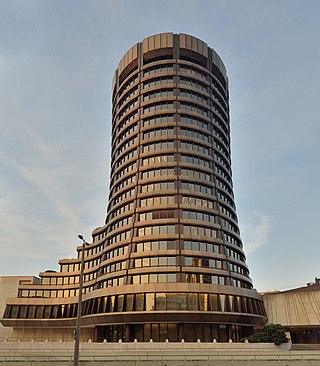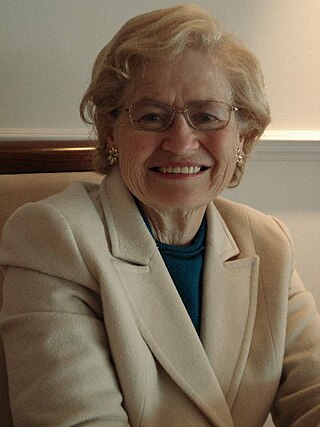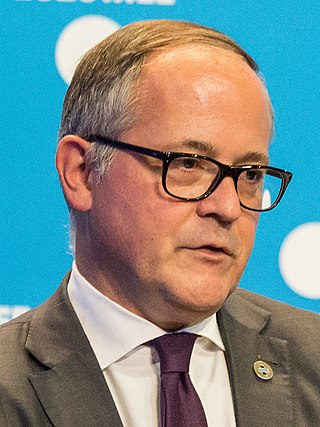Related Research Articles

The International Monetary Fund (IMF) is a major financial agency of the United Nations, and an international financial institution, headquartered in Washington, D.C., consisting of 190 countries. Its stated mission is "working to foster global monetary cooperation, secure financial stability, facilitate international trade, promote high employment and sustainable economic growth, and reduce poverty around the world." Formed in 1944, started on December 27, 1945, at the Bretton Woods Conference, primarily by the ideas of Harry Dexter White and John Maynard Keynes, it came into formal existence in 1945 with 29 member countries and the goal of reconstructing the international monetary system. It now plays a central role in the management of balance of payments difficulties and international financial crises. Countries contribute funds to a pool through a quota system, from which countries experiencing balance of payments problems can borrow money. As of 2016, the fund had SDR 477 billion. The IMF is regarded as the global lender of last resort.

The Bank for International Settlements is an international financial institution which is owned by member central banks. Its primary goal is to foster international monetary and financial cooperation while serving as a bank for central banks.

The Bretton Woods Conference, formally known as the United Nations Monetary and Financial Conference, was the gathering of 730 delegates from all 44 allied nations at the Mount Washington Hotel, in Bretton Woods, New Hampshire, United States, to regulate the international monetary and financial order after the conclusion of World War II.

The global financial system is the worldwide framework of legal agreements, institutions, and both formal and informal economic actors that together facilitate international flows of financial capital for purposes of investment and trade financing. Since emerging in the late 19th century during the first modern wave of economic globalization, its evolution is marked by the establishment of central banks, multilateral treaties, and intergovernmental organizations aimed at improving the transparency, regulation, and effectiveness of international markets. In the late 1800s, world migration and communication technology facilitated unprecedented growth in international trade and investment. At the onset of World War I, trade contracted as foreign exchange markets became paralyzed by money market illiquidity. Countries sought to defend against external shocks with protectionist policies and trade virtually halted by 1933, worsening the effects of the global Great Depression until a series of reciprocal trade agreements slowly reduced tariffs worldwide. Efforts to revamp the international monetary system after World War II improved exchange rate stability, fostering record growth in global finance.

The Bretton Woods system of monetary management established the rules for commercial and financial relations among the United States, Canada, Western European countries, Australia, and Japan after the 1944 Bretton Woods Agreement. The Bretton Woods system was the first example of a fully negotiated monetary order intended to govern monetary relations among independent states. The Bretton Woods system required countries to guarantee convertibility of their currencies into U.S. dollars to within 1% of fixed parity rates, with the dollar convertible to gold bullion for foreign governments and central banks at US$35 per troy ounce of fine gold. It also envisioned greater cooperation among countries in order to prevent future competitive devaluations, and thus established the International Monetary Fund (IMF) to monitor exchange rates and lend reserve currencies to nations with balance of payments deficits.
John Harold Williamson was a British-born economist who coined the term Washington Consensus. He served as a senior fellow at the Peterson Institute for International Economics from 1981 until his retirement in 2012. During that time, he was the project director for the United Nations High-Level Panel on Financing for Development in 2001. He was also on leave as chief economist for South Asia at the World Bank during 1996–99, adviser to the International Monetary Fund from 1972 to 1974, and an economic consultant to the UK Treasury from 1968 to 1970. He was also an economics professor at Pontifícia Universidade Católica do Rio de Janeiro (1978–81), University of Warwick (1970–77), Massachusetts Institute of Technology, University of York (1963–68) and Princeton University (1962–63).
International economics is concerned with the effects upon economic activity from international differences in productive resources and consumer preferences and the international institutions that affect them. It seeks to explain the patterns and consequences of transactions and interactions between the inhabitants of different countries, including trade, investment and transaction.

Raghuram Govind Rajan is an Indian economist and the Katherine Dusak Miller Distinguished Service Professor of Finance at the University of Chicago's Booth School of Business. Between 2003 and 2006 he was Chief Economist and director of research at the International Monetary Fund. From September 2013 through September 2016 he was the 23rd Governor of the Reserve Bank of India. In 2015, during his tenure at the RBI, he became the Vice-Chairman of the Bank for International Settlements.
Capital controls are residency-based measures such as transaction taxes, other limits, or outright prohibitions that a nation's government can use to regulate flows from capital markets into and out of the country's capital account. These measures may be economy-wide, sector-specific, or industry specific. They may apply to all flows, or may differentiate by type or duration of the flow.

Avinash D. Persaud is Emeritus Professor of Gresham College in the UK. He was Chairman of Intelligence Capital Ltd., a company specializing in analyzing, managing and creating financial liquidity in investment projects and portfolios. He was also the non-Executive Chairman of the London-based Elara Capital, an investment bank. Persaud was a Non-resident Senior Fellow of the Peterson Institute of International Economics, Executive Fellow of London Business School and Senior Fellow with the Caribbean Policy Research Institute and Head of its Barbados office.

The Institute of International Finance (IIF) is the association or trade group for the global financial services industry. It was created by 38 banks of leading industrialized countries in 1983 in response to the international debt crisis of the early 1980s, and has since expanded to represent more than 490 firms from more than 70 countries. IIF members include commercial and investment banks, asset managers, insurance companies, sovereign wealth funds, hedge funds, central banks and development banks.

Nemat Talaat Shafik, Baroness Shafik,, also known as Minouche Shafik, is an Egyptian-born British-American economist. She has been serving as the President and Vice Chancellor of the London School of Economics since September 2017. Beginning on 1 July 2023, she will serve as the 20th and incoming president of Columbia University, the first woman since its founding in the year 1754. She also currently serves as Board Member of Bill & Melinda Gates Foundation.

Stijn Claessens is a Dutch economist who currently serves as the Head of Financial Stability Policy department of the Bank for International Settlements. He worked for fourteen years at World Bank beginning in 1987 until 2001 where he assumed various positions including that of Lead Economist. Following his tenure at the World Bank he became Professor of International Finance Policy at the University of Amsterdam where he remained for three years and still is on the faculty. Stijn has many distinguished academic publications and his work has been cited in many outlets including The Wall Street Journal, The Financial Times, The Economist, The Washington Post and various other publications and he has appeared in several television programs.
Macroprudential regulation is the approach to financial regulation that aims to mitigate risk to the financial system as a whole. In the aftermath of the late-2000s financial crisis, there is a growing consensus among policymakers and economic researchers about the need to re-orient the regulatory framework towards a macroprudential perspective.

Stephany Griffith-Jones is an economist specializing in international finance and development. Her expertise lies in the reform of the international financial system, particularly in financial regulation, global governance, and international capital flows. Currently, she serves as a member of the Governor Board at the Central Bank of Chile. She has held various positions throughout her career, including financial markets director at the Initiative for Policy Dialogue based at Columbia University, associate fellow at the Overseas Development Institute, and professorial fellow at the Institute of Development Studies at Sussex University.
International lender of last resort (ILLR) is a facility prepared to act when no other lender is capable or willing to lend in sufficient volume to provide or guarantee liquidity in order to avert a sovereign debt crisis or a systemic crisis. No effective international lender of last resort currently exists.

Klaas Henderikus Willem Knot is a Dutch economist and central banker who is the current President of the Dutch central bank De Nederlandsche Bank (DNB). In this capacity he serves as a member of the Governing Council of the European Central Bank (ECB), as well as of the Board of Governors of the International Monetary Fund (IMF). Knot also holds a position as Professor in Monetary Stability at the University of Amsterdam and honorary professor at the University of Groningen.

Benoît Georges Cœuré is a French economist who has been serving as President of the Autorité de la concurence since 2022. He previously served as a member of the Executive Board of the European Central Bank from 2012 to 2019.

Nicoletta Batini is an Italian economist, notable as a scholar of innovative monetary and fiscal policy practices. During the crisis she pioneered the IMF work exposing the dangers of excessive fiscal austerity and designed ways to consolidate public debt successfully during phases of financial deleveraging. Since 2003 at the International Monetary Fund, she has served as Advisor of the Bank of England’s Monetary Policy Committee between 2000-2003 and was Professor of Economics at the University of Surrey (2007-2012), and Director of the International Economics and Policy office of the Department of the Treasury of Italy’s Ministero dell’Economia e delle Finanze (MEF) between 2013-2015. Batini's fields of expertise include monetary policy, public finance, open economy macroeconomics, labor economics, energy and environmental economics, and economic modeling. She has handled extensive consultancy roles in the public sector in advanced and emerging market countries. She holds a Ph.D. in international finance from the Scuola Superiore S. Anna and a Ph.D. in monetary economics from the University of Oxford.

Liviu Voinea is Romania's representative to the International Monetary Fund and Senior Advisor to the IMF Executive Director starting 26 August 2019. In this capacity he is a member of the Executive Board of the International Monetary Fund. He also represents Montenegro to the IMF.
References
- ↑ Catalogue of the Alpha Delta Phi: 1832-1966. New York, NY: The Executive Council of The Alpha Delta Phi Fraternity. 1966. p. 205.
- ↑ Blount, E. 2003. New CEO takes the helm at an evolving BIS. ABA Banking Journal. December 2003, p. 42.
- ↑ "BIS General Manager to step down".
- ↑ "Malcolm D. Knight to join Deutsche Bank as Vice Chairman".